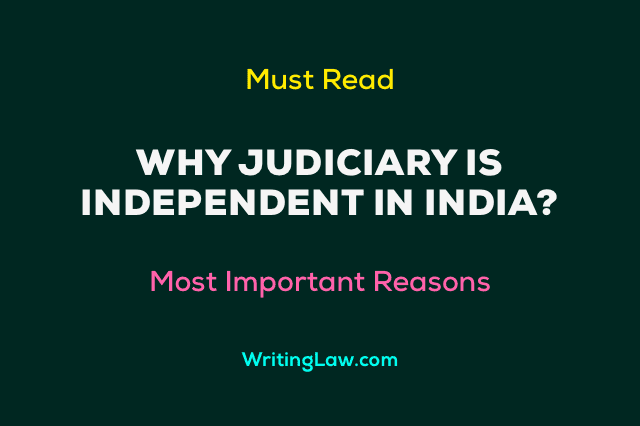
The judicial structure of the country is considered as the safeguard of the Indian Constitution and principles underlying within. It is the judiciary that protects the rights of the individuals enshrined in Part III of the Constitution.
The people of India may lose faith in other organs of the government but they have a firm belief in the judicial system of the country. Even today, when a dispute arises between people, they say to each other, “see you in the court.” Anything can get corrupted but not judiciary.
Judiciary is considered the third pillar of the government. As per Montesquieu theory of separation of powers, all three organs that is the legislature, executive and judiciary work in their own spheres.
Legislature and executive also come under the blanket of accountability, but the judiciary is separate from the executive. Article 50 of the Constitution also says that the state shall separate the judiciary from the executive.
For fair, just, and unbiased decisions, the judicial organ must be free from any kind of dominance or undue influence. The judiciary shall work upon their will and conscience and not under threat or influence.
What Does Independence of Judiciary Mean?
Independence of judiciary means ‘Judiciary work is free from any kind of external influence or control.’ Judiciary works as an independent body and not through the channel of government. In the real sense, we can say that our judiciary is sovereign. The judicial system needs to work in isolation so that the decisions shall be free from any influence.
The Preamble of the Indian Constitution promises justice social, economic and political. To achieve the motto, it is expected for the judiciary to be impartial. The judges of the country are not obliged to give a decision according to the ruling party or government. Any kind of dominance is prohibited.
The independence of the judiciary also satisfies the real test of a democratic country where the organ for delivering justice is unbiased and free. And without misuse of any power, our integrated judicial system is able to deliver an impartial decision.
Constitutional Provisions That Ensure an Independent Judiciary
Here are five provisions that answer ‘why the judiciary is free, independent, and pressure-free in India?’
1. Security of Tenure
Once a judge is appointed, he remains as a judge. The judges have the security of the tenure of their service. They are not appointed on the pleasure of the President. They can’t be removed from their office without any reasonable cause that too on the ground of misbehaviour and incapacity.
A judge of Supreme Court retires at the age of 65 years, and a judge of High Court retires at the age of 62 years. A judge once appointed can’t be removed until and unless a valid reason exists for doing so.
2. Powers of Supreme Court
The Indian Supreme Court has the power to issue writs under Article 32 of the Constitution. The Parliament can’t abridge the power of issuing a writ in any case. Parliament by law can not limit or reduce or curtail the powers of the apex court.
The Supreme Court may be vested with more powers in adverse circumstances by the Parliament but can never reduce it. The jurisdiction of the Supreme Court is the whole of India. It is considered as the final or last resort of justice.
3. Salaries and Allowances
The judges’ salaries are fixed and charged on the Consolidated Fund of India and state in the case of Supreme Court judges and High Court judges respectively. Their salaries can’t be reduced or altered until and unless an emergency arises like a financial crisis. The President of India decides the salaries of judges of the Supreme Court and High Courts.
4. Punish for Contempt
Article 129 of the Indian Constitution affirms that the Supreme Court shall be a court of record and has the authority (power) to punish for its contempt. Whereas Article 215 says that High Court shall be a court of record and have the power to punish for its contempt. Both the courts have the power to punish for their contempt, either civil or criminal contempt.
5. Prohibition on Practice After Retirement
The Supreme Court judge is not allowed to practice in any court of India after his retirement, but he can be appointed in tribunals, review panels or committees. Whereas a High Court judge is allowed to practice in the Supreme Court and other High Courts (excluding the lower courts and the High Court in which he was a judge.)
Read Next:
1. Impact of Pending Cases in Indian Courts
2. Is the Indian Parliament Supreme or the Judiciary (Supreme Court)?
3. 10 Constitutional Provisions That Guarantee Independence of Supreme Court
- 18 Most Important Amendments to the Indian Constitution - 12th August 2023
- 8 Kinds and Theories of Punishment - 22nd July 2023
- What Is the Meaning of Res Judicata in Civil Procedure Code? - 22nd January 2023







